- United States has dominated men's and women's Olympic basketball
- Legendary center Hakeem Olajuwon played in 1996 "Dream Team"
- Luis Scola was in Argentina team which snapped U.S. domination in 2004
- WNBA star Lisa Leslie won four straight gold medals for U.S..from 1996-2008
(CNN) -- For the elite basketball stars of the NBA and WNBA, winning Olympic gold is a given. Silver is for the losers.
The U.S. men's team has been champion 13 out of 16 times since 1936. American women have topped the podium six out of eight.
"Second place is unacceptable," says legendary center Hakeem Olajuwon, who was in the U.S. "Dream Team" that topped the podium in the 1996 Atlanta Olympics.
With teammates such as Shaquille O'Neal, Charles Barkley and Scottie Pippen, the Nigerian-American, who was born in Lagos, quickly came to realize that reality.
"Coming to the United States, being there for so long, then it becomes -- you are expected to win gold," he told CNN's Aiming for Gold show.
Olajuwon, who is rated one of the greatest 50 NBA players of all time, came into the Atlanta Games having helped Houston Rockets win back-to-back NBA titles in 1994 and 1995.
Security presence
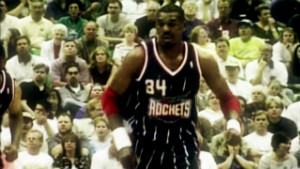 Pressure to succeed at the Olympics
Pressure to succeed at the Olympics 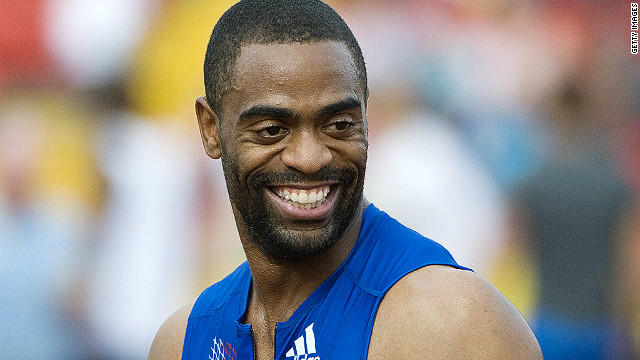 American sprinter Tyson Gay says he's in his prime and fit and ready for the London Olympics.
American sprinter Tyson Gay says he's in his prime and fit and ready for the London Olympics. 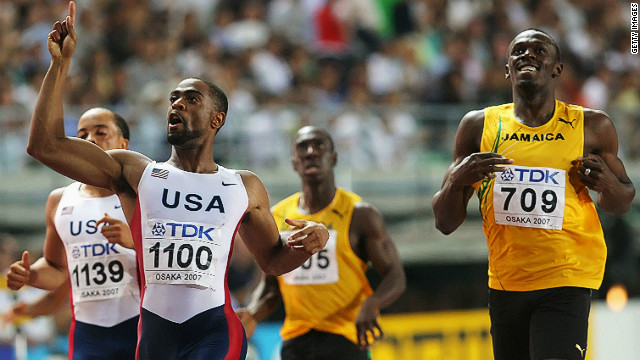 Gay will be hoping to repeat his performance at the 2007 IAAF World Athletic Championships in Osaka, Japan where he crossed the line first in the 200m ahead of Usain Bolt.
Gay will be hoping to repeat his performance at the 2007 IAAF World Athletic Championships in Osaka, Japan where he crossed the line first in the 200m ahead of Usain Bolt. 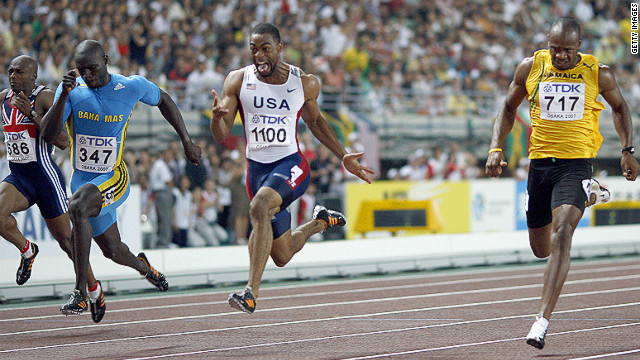 But Gay stormed to gold in the 100m, beating Derrick Atkins of the Bahamas (left) and Jamaica's Asafa Powell in a time of 9.85 seconds.
But Gay stormed to gold in the 100m, beating Derrick Atkins of the Bahamas (left) and Jamaica's Asafa Powell in a time of 9.85 seconds. 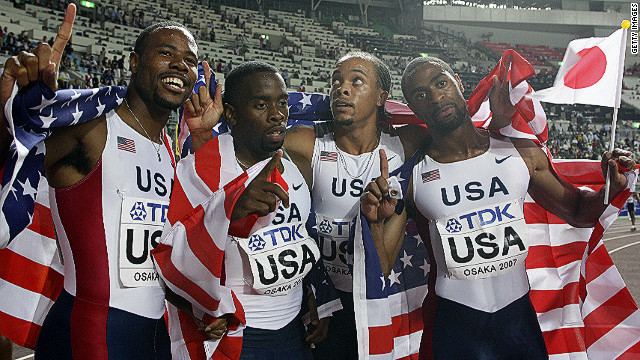 Gay also won gold as part of the U.S. 4x100m relay team.
Gay also won gold as part of the U.S. 4x100m relay team. 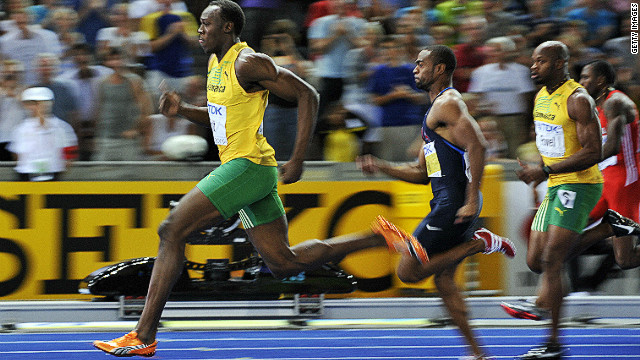 Two years later in Berlin though, triple Olympic champion Bolt won gold in the 100m and 200m, setting world record times in both. Gay had to settle for silver in the 100m.
Two years later in Berlin though, triple Olympic champion Bolt won gold in the 100m and 200m, setting world record times in both. Gay had to settle for silver in the 100m. 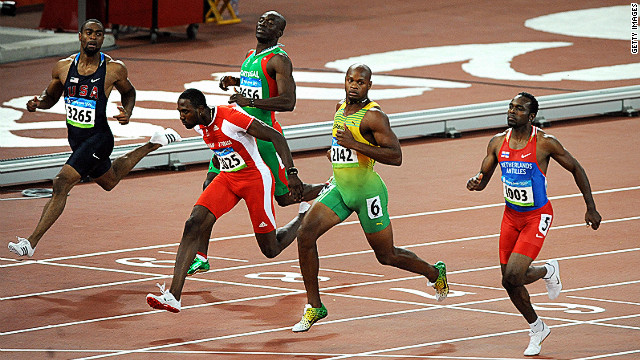 Prior to the Beijing Olympics, Gay was troubled by a hamstring injury which meant he arrived at the Games in less than perfect shape and he failed to win a medal. Here Gay (far left) finishes fifth in the 100m semifinal to miss out on the final, won by Bolt in record time.
Prior to the Beijing Olympics, Gay was troubled by a hamstring injury which meant he arrived at the Games in less than perfect shape and he failed to win a medal. Here Gay (far left) finishes fifth in the 100m semifinal to miss out on the final, won by Bolt in record time. 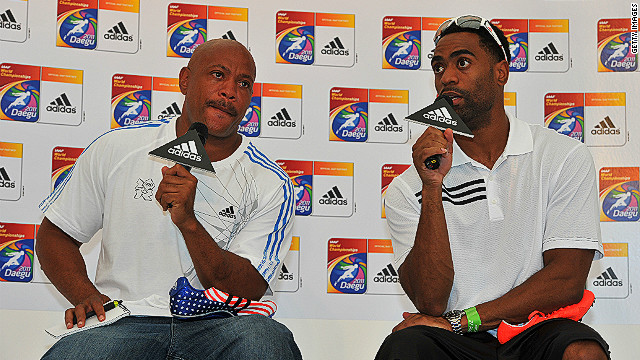 Gay counts America's retired sprinter Maurice Greene as both a hero and a mentor. The former Olympic 100m champion's advice and support "really means a lot to me," says Gay.
Gay counts America's retired sprinter Maurice Greene as both a hero and a mentor. The former Olympic 100m champion's advice and support "really means a lot to me," says Gay. 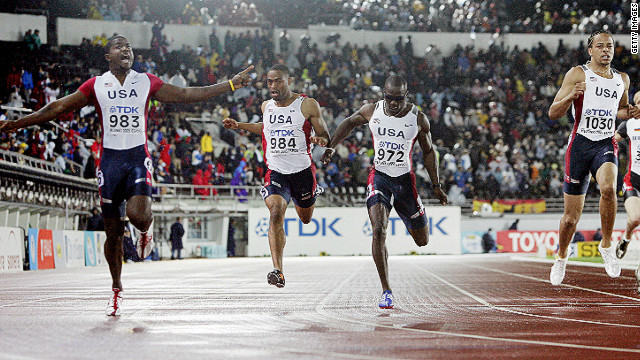 Gay's first outing at the World Championships at Helsinki's Olympic Stadium in 2005 ended without a medal. Here he can be seen (second from left) finishing fourth in the 200m final.
Gay's first outing at the World Championships at Helsinki's Olympic Stadium in 2005 ended without a medal. Here he can be seen (second from left) finishing fourth in the 200m final.  Human to Hero: Tyson Gay
Human to Hero: Tyson Gay While he enjoyed winning Olympic gold, the sheer fame of the Dream Team left them surrounded by an all-pervading security presence and he felt he missed out on the Games experience.
"We can't go anywhere -- we weren't even free to go to the (athletes') village. So it was a different experience from that perspective.
"The opening day you get all the different athletes but after that, of course, for security issues the Dream Team were by themselves."
But he added: "The Olympic gold medal is a huge accomplishment and so is my career with NBA basketball. I'm just happy that I get the opportunity to accomplish both."
Olajuwon retired in 2002 but is still involved in the game, acting as a mentor for the likes of current superstars LeBron James and Kobe Bryant.
Argentina's Luis Scola followed in Olajuwan's footsteps at Houston Rockets and to the top of the Olympic podium.
The Nightmare Team
The forward center achieved the feat at the 2004 Games in Athens, on the way beating a U.S. lineup which acquired the unfortunate label of "The Nightmare Team."
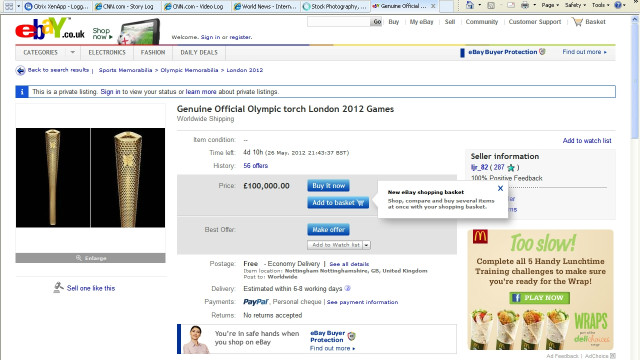 Dozens of torch bearers have put their prized mementos up for sale on eBay, with sellers seeking up to £100,000. In some cases the money has been offered to charity.
Dozens of torch bearers have put their prized mementos up for sale on eBay, with sellers seeking up to £100,000. In some cases the money has been offered to charity. 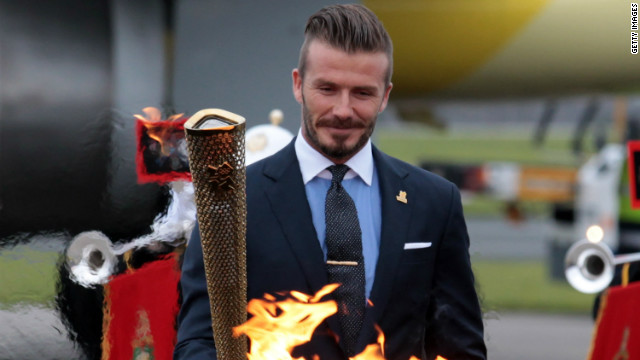 David Beckham lights the torch as it arrives at RNAS Culdrose airbase in Cornwall, England, on May 18. The footballer was part of a British delegation that flew back with the flame from Greece.
David Beckham lights the torch as it arrives at RNAS Culdrose airbase in Cornwall, England, on May 18. The footballer was part of a British delegation that flew back with the flame from Greece. 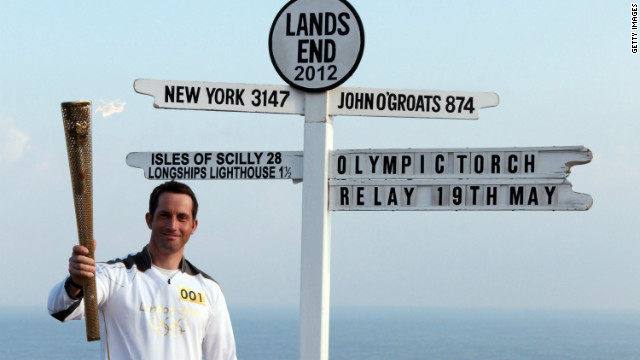 Olympic gold medal sailor Ben Ainslie is the first relay runner on British soil. The flame began its journey at Land's End, the most westerly tip of mainland Britain.
Olympic gold medal sailor Ben Ainslie is the first relay runner on British soil. The flame began its journey at Land's End, the most westerly tip of mainland Britain. 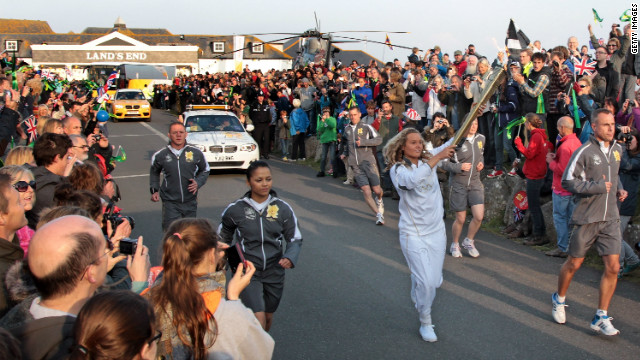 Surfer Tassy Swallow carries the flame as it leaves Land's End. She is one of 8,000 torch-bearers who will transport the flame on its 70-day journey to the Olympic Stadium in east London.
Surfer Tassy Swallow carries the flame as it leaves Land's End. She is one of 8,000 torch-bearers who will transport the flame on its 70-day journey to the Olympic Stadium in east London. 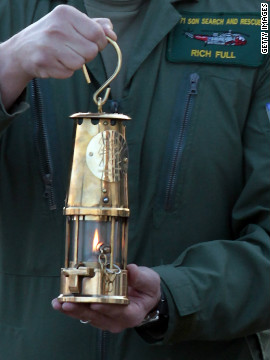
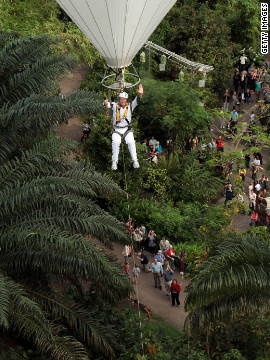
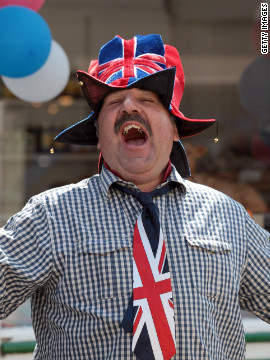
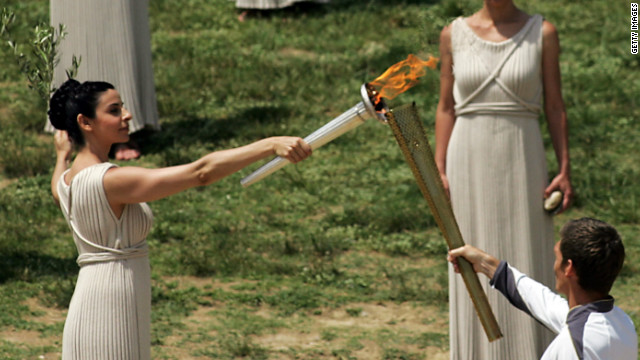 Amid the tumbledown columns and olive groves of the ancient stadium in Olympia, Greece, the 2012 flame is lit. Actor Ino Menegaki played the high priestess in the traditional ceremony on May 10.
Amid the tumbledown columns and olive groves of the ancient stadium in Olympia, Greece, the 2012 flame is lit. Actor Ino Menegaki played the high priestess in the traditional ceremony on May 10. 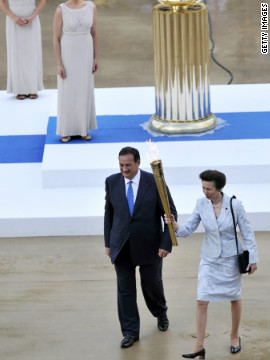
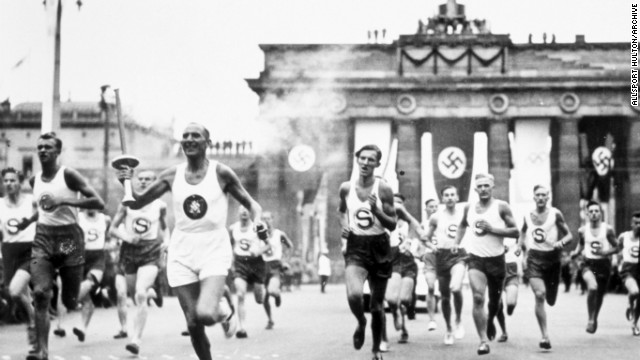 The torch relay was first used at the 1936 Olympics in Berlin, an idea instigated by Germany's then Nazi government. The flame was lit in Olympia, Greece, then carried to the Berlin stadium by runners through Bulgaria, Yugoslavia, Hungary, Austria and Czechoslovakia -- countries that would later fall under Hitler.
The torch relay was first used at the 1936 Olympics in Berlin, an idea instigated by Germany's then Nazi government. The flame was lit in Olympia, Greece, then carried to the Berlin stadium by runners through Bulgaria, Yugoslavia, Hungary, Austria and Czechoslovakia -- countries that would later fall under Hitler. 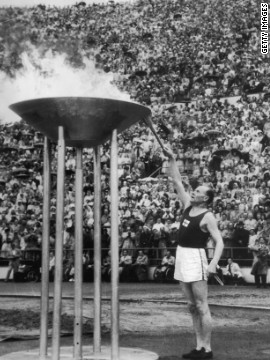
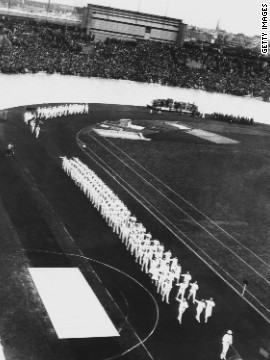
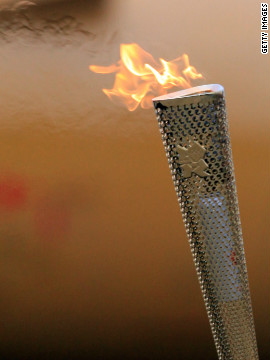
 Olympic torch bearers cash in
Olympic torch bearers cash in 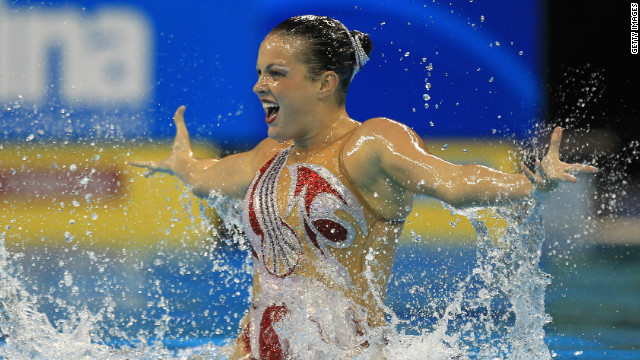 Mary Killman will be the youngest member of the U.S. synchronized swimming team at the London 2012 Olympics.
Mary Killman will be the youngest member of the U.S. synchronized swimming team at the London 2012 Olympics. 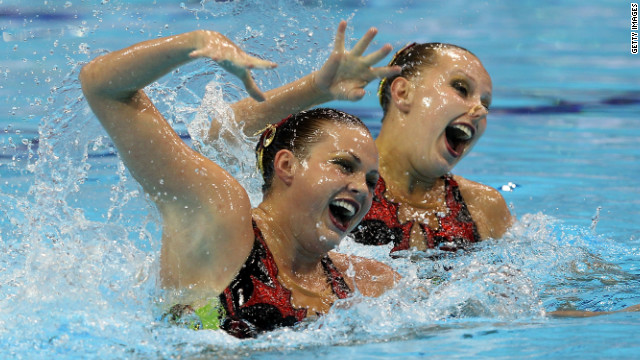 The 21-year-old will compete in the duet discipline with swimming partner Mariya Koroleva, having booked their places at the Olympic qualification event in London in April.
The 21-year-old will compete in the duet discipline with swimming partner Mariya Koroleva, having booked their places at the Olympic qualification event in London in April. 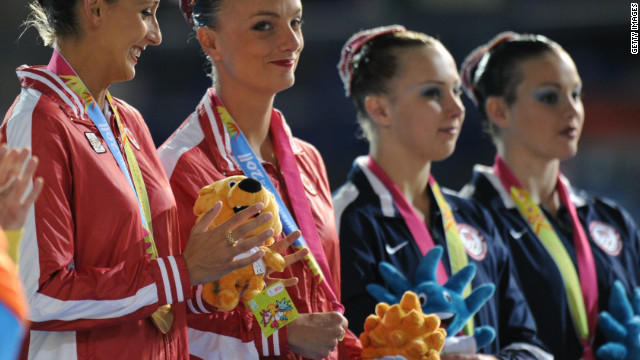 Killman and Koroleva (right) on the podium of the 2011 Pan American Games, where they won the silver medal behind the Canadian pair in the duet competition.
Killman and Koroleva (right) on the podium of the 2011 Pan American Games, where they won the silver medal behind the Canadian pair in the duet competition. 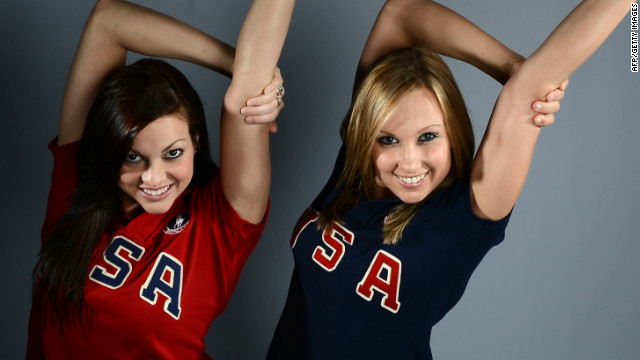 Killman and Koroleva (right) have been performing together since last year.
Killman and Koroleva (right) have been performing together since last year. 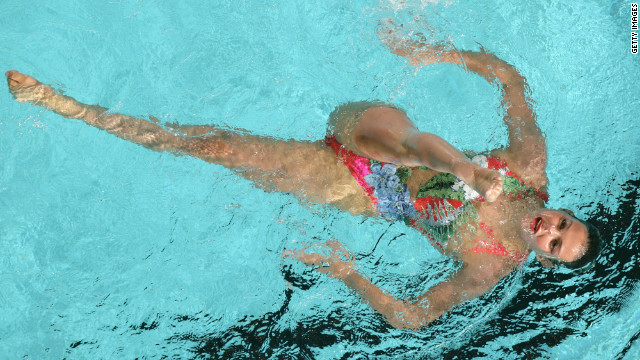 Killman on her way to fourth place in the solo event at the 2007 United States Championships at Indiana State University. She was still a junior.
Killman on her way to fourth place in the solo event at the 2007 United States Championships at Indiana State University. She was still a junior. 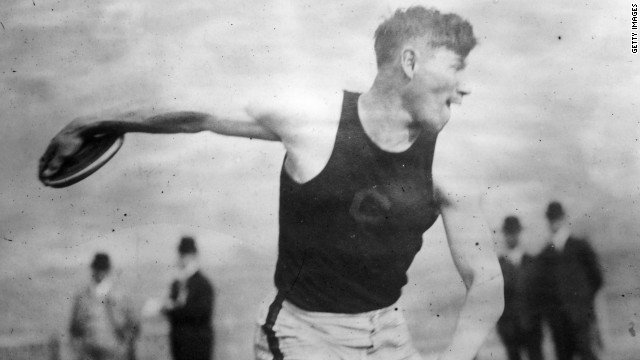 She is inspired by fellow Native American Jim Thorpe, who won two gold medals in track and field at the 1912 Olympics and is one of the greatest all-round athletes in sporting history.
She is inspired by fellow Native American Jim Thorpe, who won two gold medals in track and field at the 1912 Olympics and is one of the greatest all-round athletes in sporting history.  Human to Hero: Mary Killman
Human to Hero: Mary Killman It was a stunning upset, but proof that the rest of the world had raised their standards to match America's NBA elite.
"I take a lot of pride in the gold medal because of the whole experience that happened behind it," he told CNN.
"When you talk to somebody here in the U.S. and they find out you played in the Olympics and they are like, 'Wow, the Olympics?' 'Yeah.' 'How did you do?' 'We won it.' They are stunned, they cannot believe it really."
U.S. basketball chiefs were sufficiently stunned to revamp its organization and coaching staff so by the 2008 Olympics in Beijing traditional dominance had been restored.
Scola and his Argentina teammates took the bronze medal in China.
He will be in an Argentina squad attempting to cause another upset at the 2012 Olympics in London, but believes U.S. success is almost inevitable.
"There are three big sports here: baseball, American football and basketball. Basketball is really the only one that's played in the Olympics. So I think that plays a role too.
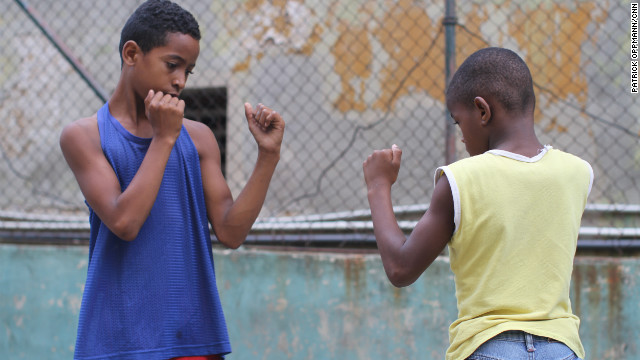 Boys at a Havana gym practice their boxing stance. Boxing, like baseball, is a sport many Cubans are passionate about.
Boys at a Havana gym practice their boxing stance. Boxing, like baseball, is a sport many Cubans are passionate about. 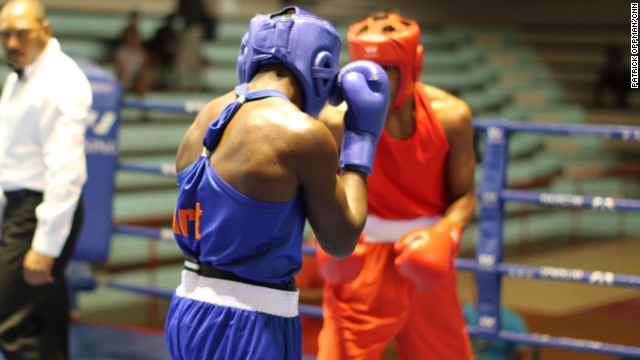 Cuban fighters square off at a regional boxing tournament. A victory here could lead to a selection for the country's national team and the possibility of representing Cuba at the Olympics.
Cuban fighters square off at a regional boxing tournament. A victory here could lead to a selection for the country's national team and the possibility of representing Cuba at the Olympics. 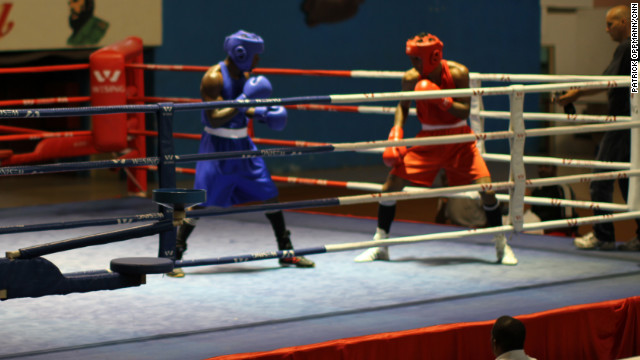 Boxers in Cuba fight at an exhibition match on May 10, 2012. Despite the fact that fighters cannot compete professionally, the country has consistently produced world-class boxers.
Boxers in Cuba fight at an exhibition match on May 10, 2012. Despite the fact that fighters cannot compete professionally, the country has consistently produced world-class boxers. 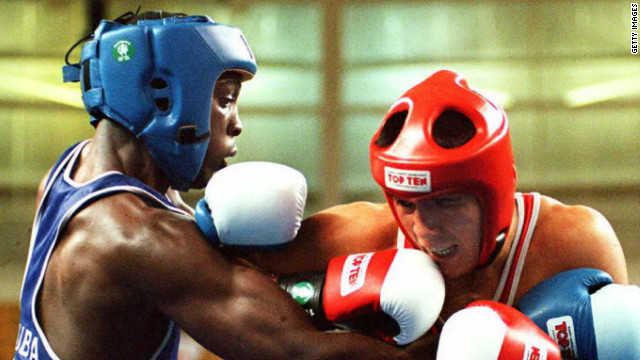 Hector Vinent Charon trains the youngsters at the Rafael Trejo boxing gym in Havana. Charon (left) is a two-time Olympic gold medalist, having won the light welterweight at both the 1992 and 1996 Games.
Hector Vinent Charon trains the youngsters at the Rafael Trejo boxing gym in Havana. Charon (left) is a two-time Olympic gold medalist, having won the light welterweight at both the 1992 and 1996 Games. 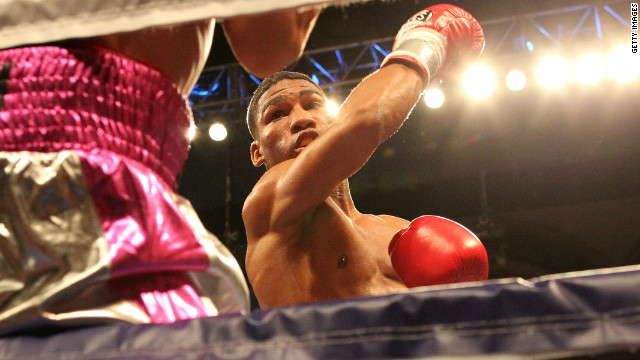 Professional sport is outlawed in Cuba, but it does not stop some of its athletes making money from their talent. Yuriorkis Gamboa won gold at the 2004 Athens Olympics before defecting and eventually launching a pro career in the U.S.
Professional sport is outlawed in Cuba, but it does not stop some of its athletes making money from their talent. Yuriorkis Gamboa won gold at the 2004 Athens Olympics before defecting and eventually launching a pro career in the U.S. 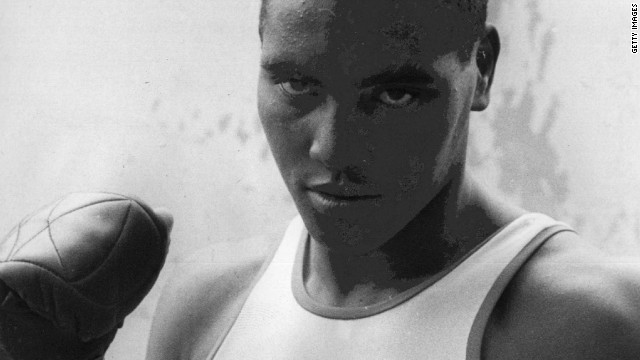 Cuba has an incredible Olympic boxing pedigree, having won 32 gold medals in the sport. Teofilo Stevenson is arguably the country's greatest Olympian, winning three heavyweight golds from 1972.
Cuba has an incredible Olympic boxing pedigree, having won 32 gold medals in the sport. Teofilo Stevenson is arguably the country's greatest Olympian, winning three heavyweight golds from 1972. 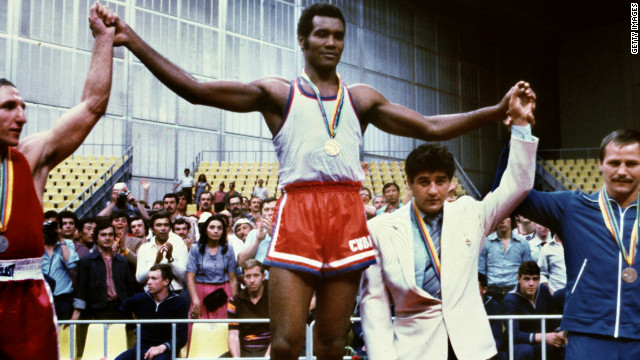 Stevenson's final gold came at the 1980 Moscow Games, where he beat Piotr Zaev of the Soviet Union in the final. Stevenson was also crowned world amateur champion on three occasions.
Stevenson's final gold came at the 1980 Moscow Games, where he beat Piotr Zaev of the Soviet Union in the final. Stevenson was also crowned world amateur champion on three occasions. 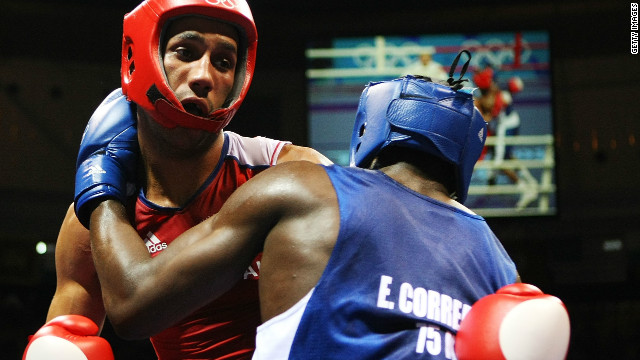 In Beijing four years ago, Cuba failed to clinch an Olympic gold. Emilio Correa (left) had to settle for silver after losing to Britain's James DeGale in the middleweight final.
In Beijing four years ago, Cuba failed to clinch an Olympic gold. Emilio Correa (left) had to settle for silver after losing to Britain's James DeGale in the middleweight final.  Cuba's boxing legacy
Cuba's boxing legacy 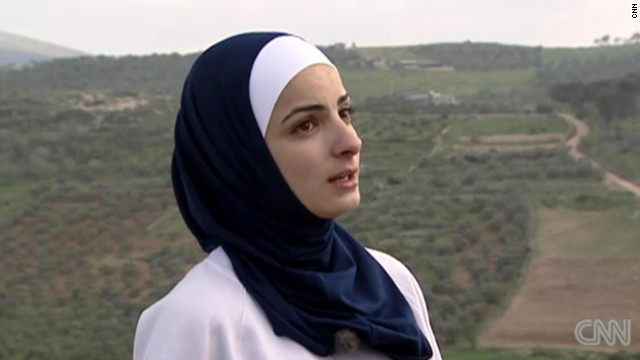 Woroud Sawalha will be one of four athletes competing under the Palestinian flag at the London Olympics, and the only woman.
Woroud Sawalha will be one of four athletes competing under the Palestinian flag at the London Olympics, and the only woman.  Palestinian athletes have been training in substandard conditions against the backdrop of the region's continuing fight for independence from Israel.
Palestinian athletes have been training in substandard conditions against the backdrop of the region's continuing fight for independence from Israel. 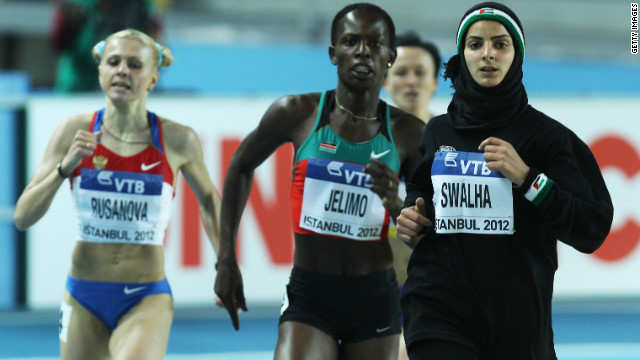 The 20-year-old Sawalha competed at the world indoor championships in Turkey in March -- her first experience of top-level international competition.
The 20-year-old Sawalha competed at the world indoor championships in Turkey in March -- her first experience of top-level international competition. 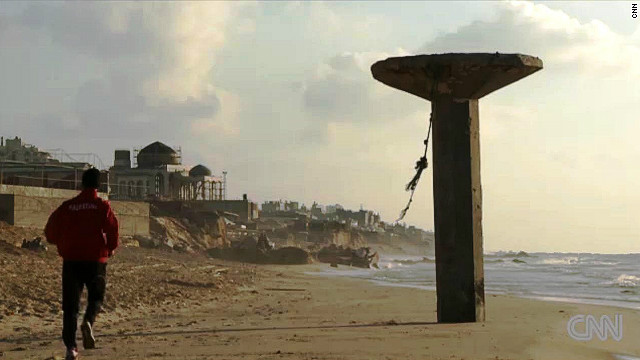 Bahaa al-Farra, a 400-meter runner, has no proper track to train on near his home in Gaza and no starting blocks.
Bahaa al-Farra, a 400-meter runner, has no proper track to train on near his home in Gaza and no starting blocks. 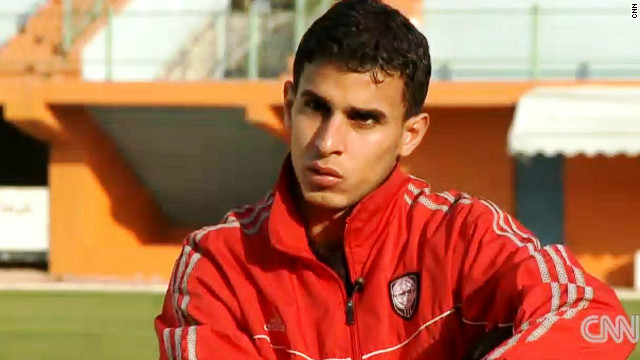 Al-Farra knows he faces an unequal struggle in London but he hopes to prove he can compete even without proper training facilities.
Al-Farra knows he faces an unequal struggle in London but he hopes to prove he can compete even without proper training facilities.  Palestinian athletes eager for Olympic chance
Palestinian athletes eager for Olympic chance "There's a lot of talent in the U.S., a lot of talent. There's 10 different teams you can pick players from and that will be a very good team and eventually you can win a medal or a gold medal, no question about that."
Women's star
For WNBA legend Lisa Leslie, defeat at the Olympics just wasn't an option. She played in four Games and won four golds with an all-conquering U.S. squad from 1996 to 2008.
"I really loved that moment of being on the podium and having the gold medal placed around my neck, just listening to the chants and listening to our national anthem -- that always gives me chills," she told CNN.
"That was my favorite sports moment."
Boosted by her record 488 points, 241 rebounds and 36 blocked shots in Olympic competition, Leslie and her teammates had a remorseless winning attitude.
"Our main goal was one game at a time, one country, one goal, and that's to win a gold medal."
Leslie, who retired from the Los Angeles Sparks in 2009, will go down in history as the first woman to complete a slam dunk in a professional game.
The six foot five inch center achieved the feat in 2002 and went on to make it her trademark during a glittering career.
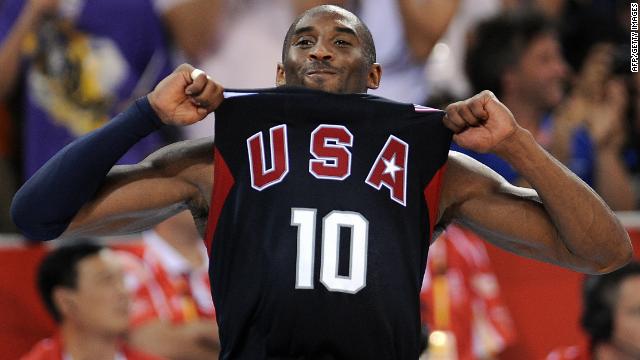 Kobe Bryant helped the U.S. men's team win basketball gold at the 2008 Olympics in Beijing.
Kobe Bryant helped the U.S. men's team win basketball gold at the 2008 Olympics in Beijing. 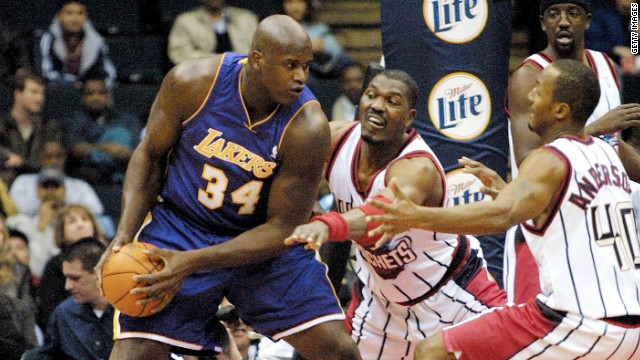 It maintained the tradition of America's "Dream Team." The 1996 lineup included Houston Rockets' Hakeem Olajuwon (center) and Shaquille O'Neal of the Lakers.
It maintained the tradition of America's "Dream Team." The 1996 lineup included Houston Rockets' Hakeem Olajuwon (center) and Shaquille O'Neal of the Lakers. 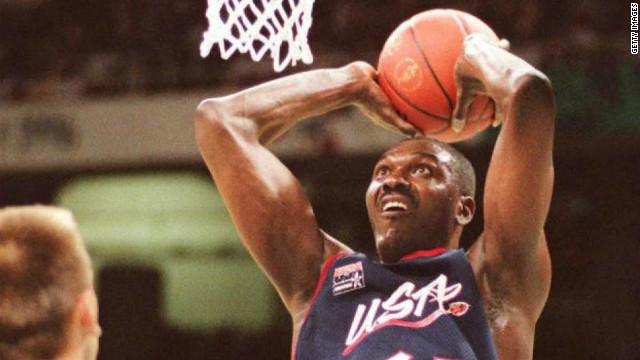 Olajuwon shoots to score for the United States during a 1996 Olympic Games match against Croatia. The "Dream Team" won gold on their home courts.
Olajuwon shoots to score for the United States during a 1996 Olympic Games match against Croatia. The "Dream Team" won gold on their home courts. 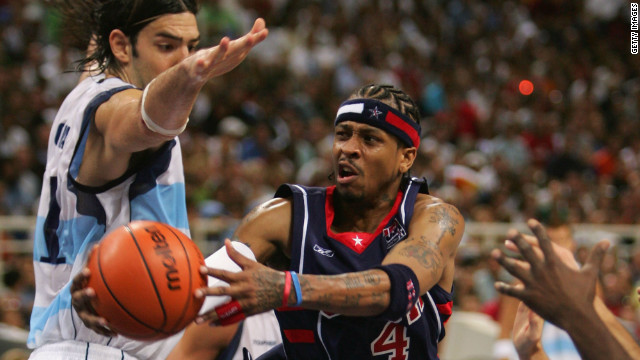 Luis Scola gets up close to Allen Iverson during Argentina's semifinal win over the United States at the 2004 Athens Olympics.
Luis Scola gets up close to Allen Iverson during Argentina's semifinal win over the United States at the 2004 Athens Olympics. 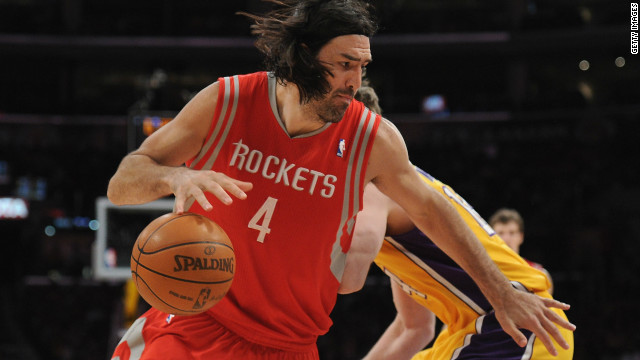 Scola also plays for Houston Rockets, pictured here in action against the LA Lakers in an NBA clash.
Scola also plays for Houston Rockets, pictured here in action against the LA Lakers in an NBA clash. 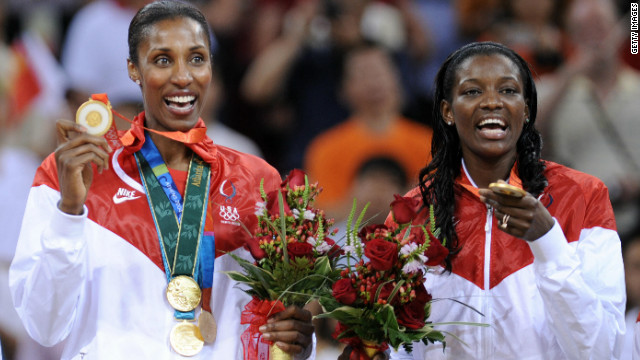 Lisa Leslie, left, proudly displays the four gold medals she won after collecting the last at the 2008 Beijing Olympics.
Lisa Leslie, left, proudly displays the four gold medals she won after collecting the last at the 2008 Beijing Olympics. 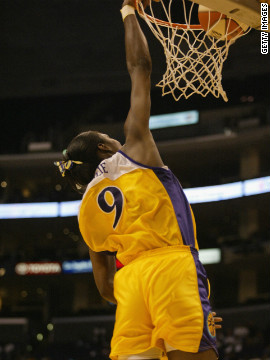













No comments:
Post a Comment